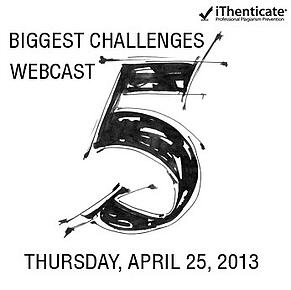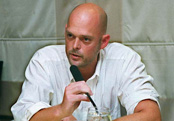 What would you do if, while reviewing papers written by scholars, you repeatedly found papers to contain around 30% of unattributed, copied work? How would you handle working with these scholars? How would you protect your institution/organization from being associated with such plagiarism? This is a similar situation that Sarah S., subcontractor for USAID, found herself in. Having worked extensively with researchers, particularly from developing countries, Sarah was put to the test to mitigate risks by educating scholars about plagiarism and ethical issues, and using iThenticate plagiarism detection software. Sarah spoke to me about her experiences in this exclusive interview.
What would you do if, while reviewing papers written by scholars, you repeatedly found papers to contain around 30% of unattributed, copied work? How would you handle working with these scholars? How would you protect your institution/organization from being associated with such plagiarism? This is a similar situation that Sarah S., subcontractor for USAID, found herself in. Having worked extensively with researchers, particularly from developing countries, Sarah was put to the test to mitigate risks by educating scholars about plagiarism and ethical issues, and using iThenticate plagiarism detection software. Sarah spoke to me about her experiences in this exclusive interview.
Menu
-
Solutions
-
Our Solutions
-
AcademicSurface potential plagiarism prior to publication with iThenticate’s expansive content database.
-
AdmissionsScreen personal essays for potential plagiarism and help ensure the highest level of integrity even before matriculation.
-
GovernmentEnsure the originality of public-facing content, from legal documents to grant applications, and reporting.
-
MedicalPrevent invalid findings dissemination, grant misconduct, and improper medical practices.
-
PublishingProtect your journal’s reputation by publishing only the highest quality articles.
-
-
Resources
-
Our Resources
-
FAQFind the answers to the commonly asked questions about how iThenticate works.
-
Content DatabaseComprehensive coverage you can trust across the internet, scholarly articles, and industry papers.
-
GuidanceSearch our comprehensive site for the launch, integration and usage information.
-
-
Pricing
-
Login
-
Buy Credits




 The recent plagiarism scandals in Germany
The recent plagiarism scandals in Germany
 Jonah Lehrer, best known for a plagiarism and fabrication scandal that ended his once-promising career in science journalism, recently created a controversy
Jonah Lehrer, best known for a plagiarism and fabrication scandal that ended his once-promising career in science journalism, recently created a controversy  It’s been another rough week for German Chancellor Angela Merkel. Annette Schavan, a member of Merkel’s cabinet and the Education Minister for the country, has
It’s been another rough week for German Chancellor Angela Merkel. Annette Schavan, a member of Merkel’s cabinet and the Education Minister for the country, has  There are few accusations and allegations that can haunt a person and their career longer than an allegation of plagiarism. This is partly because plagiarism is seen as a serious offence, especially in academic, journalism and literary circles. However, it’s also because the lines between what is and is not plagiarism is frequently blurry and prone to debate.
There are few accusations and allegations that can haunt a person and their career longer than an allegation of plagiarism. This is partly because plagiarism is seen as a serious offence, especially in academic, journalism and literary circles. However, it’s also because the lines between what is and is not plagiarism is frequently blurry and prone to debate.